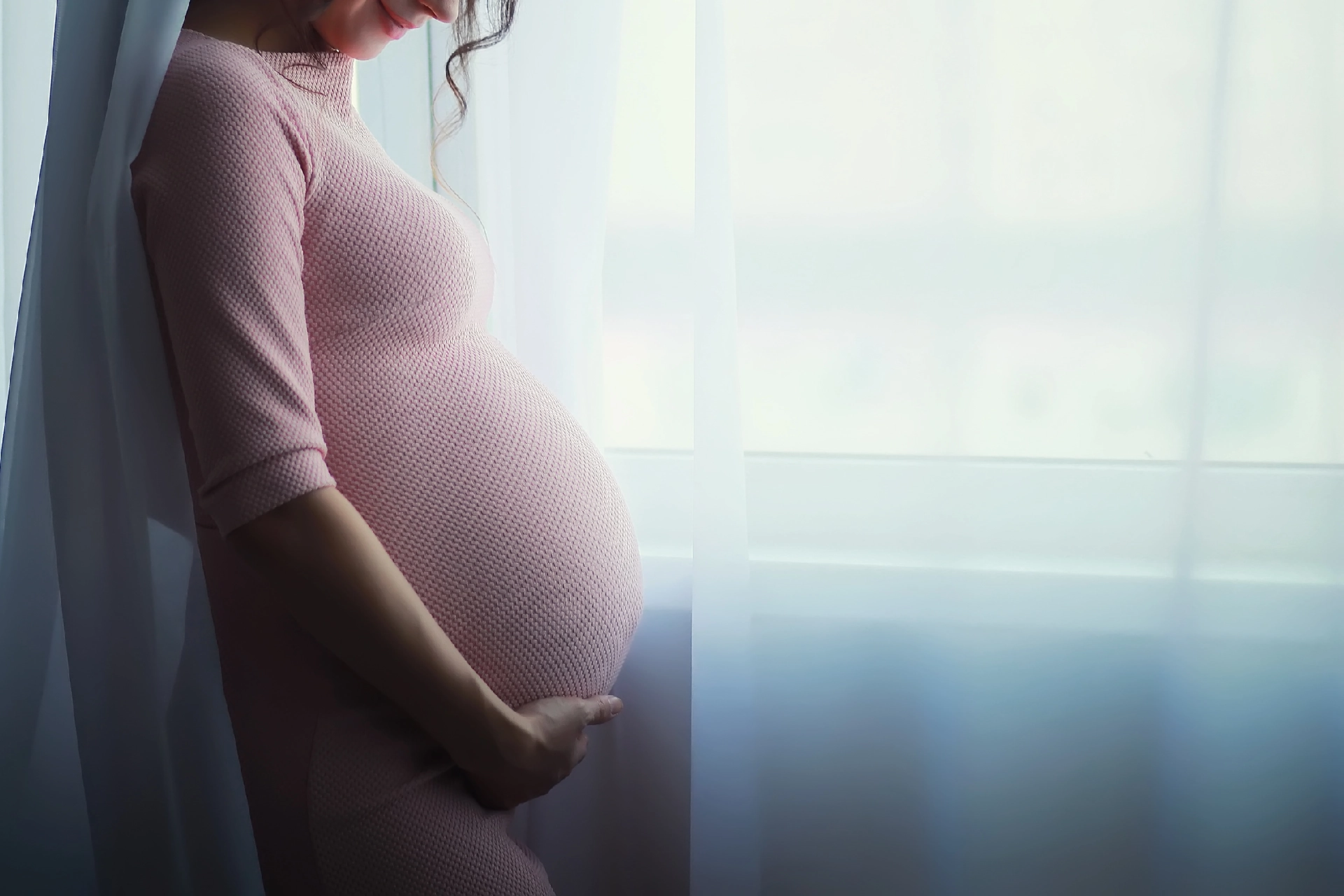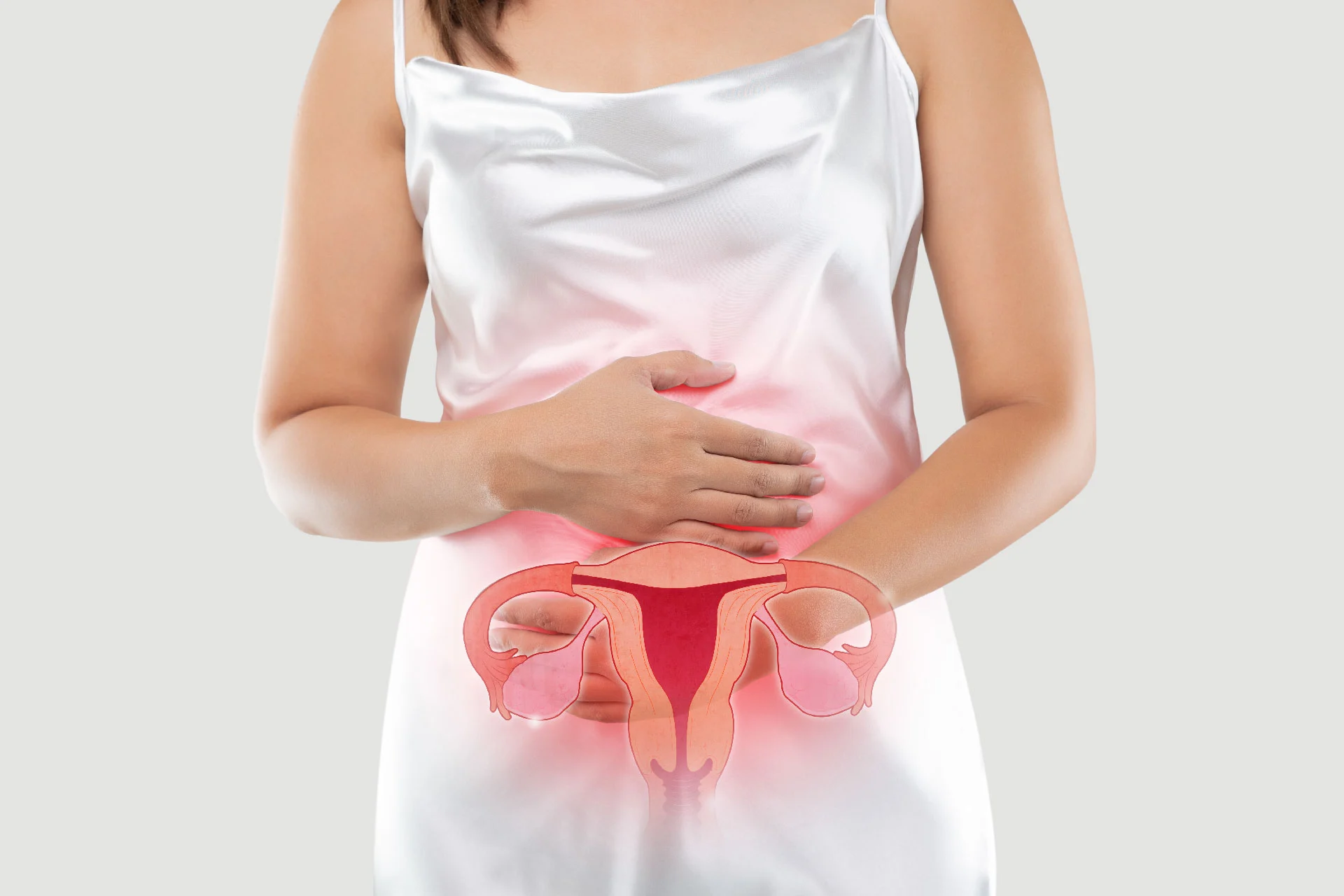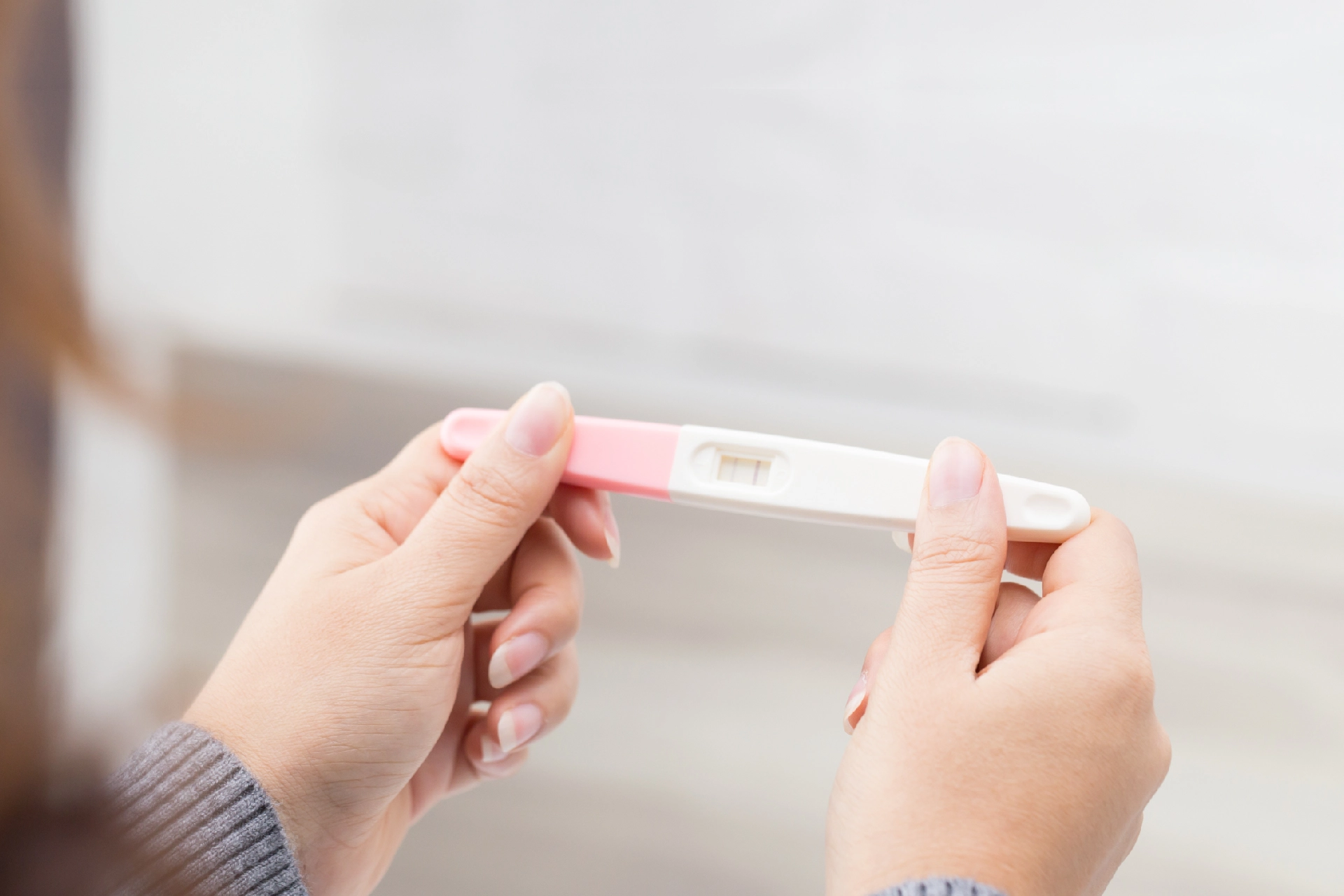Women's Health | 7 min read
What Causes Pregnancy Spotting During The Trimesters?
Medically reviewed by
Table of Content
Synopsis
Pregnancy spotting is a kind of vaginal bleeding. From conception time (when the egg gets fertilized) until delivery, it can occur at any time. To learn more about its risks and treatments, read the blog now!
Key Takeaways
- Spotting is any bleeding from the vagina except your menstrual period
- Medical help is a must for spotting during pregnancy
- Spotting is a common symptom indicating early pregnancy
Pregnancy spotting is not always a bad thing. It's a common worry that many expectant mothers have during the first 12 weeks of their pregnancies. However, most women who experience bleeding during pregnancy go on to have healthy babies.
What Causes Pregnancy Spotting
Spotting in early pregnancy can have a variety of causes, some serious and some not. Miscarriage is undoubtedly a common occurrence. Pregnancy potting can also be due to an ectopic pregnancy, in which an unviable embryo implants in the fallopian tubes. Treatment is necessary because this is a medical emergency. [1]
However, there are numerous potential causes for spotting during early pregnancy in a healthy, normal pregnancy. The following are some of them:
Irritation of the cervix
Following any sexual activity, a recent pelvic exam, or transvaginal ultrasound, the cervix may irritate and bleed. During pregnancy, the cervix becomes extremely vascular and occasionally bleeds upon slight contact.
This bleeding is not harmful. Early in a pregnancy, there is no need to refrain from sexual activity, pelvic exams, or ultrasounds.
Implantation Bleeding
Light vaginal bleeding, or implantation bleeding, can occur 10 to 14 days after conceiving in some women. Although you might mistake early pregnancy bleeding for a period, it's actually an early sign of pregnancy. You don't need treatment, and it isn't dangerous. Implantation bleeding, which occurs in almost 25% of pregnancies, indicates that a fertilized egg has implanted, or attached, to a woman's uterus.
Implantation bleeding has no impact on the viability of the pregnancy and is not a warning that something is wrong. However, to confirm your pregnancy, it's critical to get a gynecologist consultation. In addition, if you are pregnant, you need to stop engaging in behaviours that might harm your unborn child, like drinking alcohol, smoking, or using specific medications.
Cervical Ectopy
Cervical Ectopy is the term for the invasion of cells. They are found mainly in the uterus or cervical canal, close to the cervix's surface. These delicate cells often bleed easily from minor irritation. Ectopy is more prevalent in pregnant women with a history of vaginal delivery and those who have taken birth control pills for a prolonged period. Furthermore, this kind of pregnancy spotting is risk-free.
Cervicitis
Cervicitis is also known as an infection of the cervix. It is an inflammation of the cervix brought on by contamination. These can be non-sexually transmitted effects like bacterial vaginosis or sexually transmitted infections (STIs) like chlamydia, gonorrhea, trichomonas, or genital herpes. Cervicitis can also occur due to an allergy to condom latex or irritation from the diaphragm.
STIs can harm your fetus and pregnancy if they are allowed to advance themselves.
Fever, a burning sensation, bumps or blisters in or around the vaginal area, or an unpleasant-smelling vaginal discharge are frequently additional symptoms of STIs. Speak with your doctor if you experience any of these signs or are worried you might have an STI or any other infection.
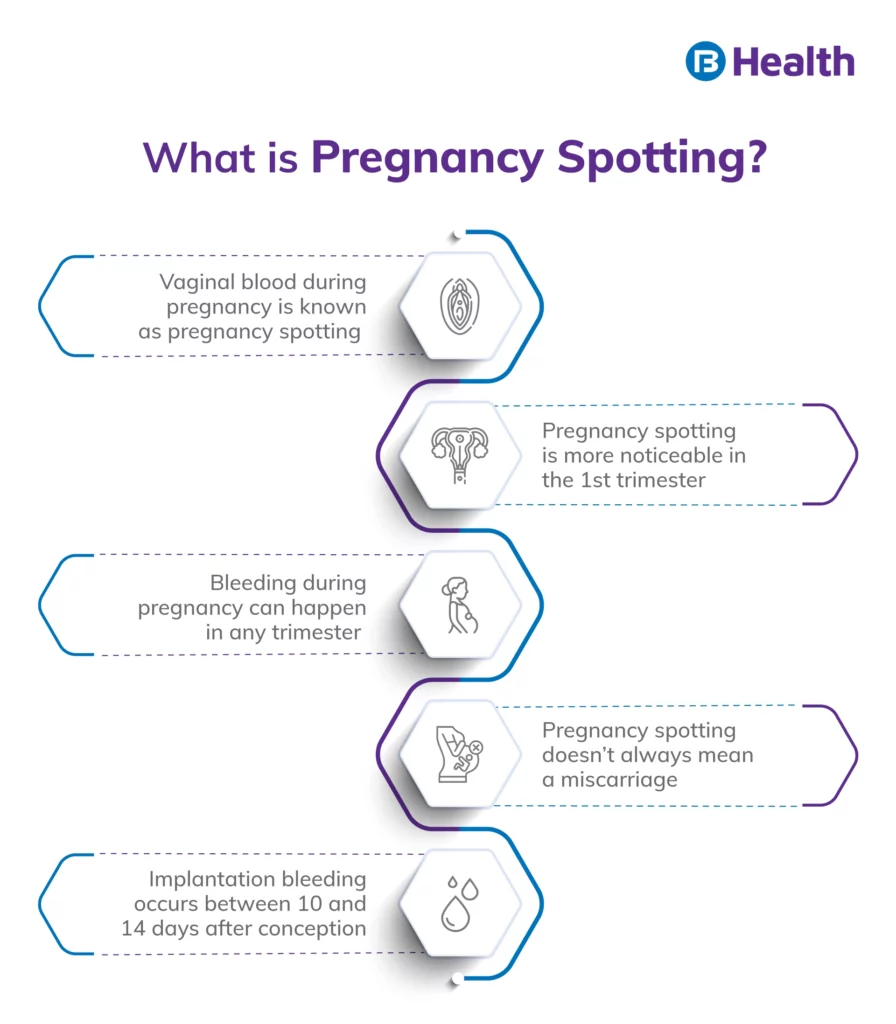
What Causes Pregnancy Spotting During the 2nd & 3rd Trimesters?
During the 2nd and 3rd trimesters of pregnancy, when spotting happens, the cause is often unknown. Pregnancy spotting itself does not necessarily signify a problem, especially if it is light and transient. However, if it develops into heavier bleeding, it can be concerning, especially in the second half of pregnancy.
Spotting during the second trimester
During the second trimester, you may feel irritation in your cervix, typically after a cervical exam or sex, leading to light bleeding or spotting. It is common and generally not anything risky.
Another possible reason for the blood flow in this phase is a cervical polyp. Because there are more blood vessels in the tissue around the cervix, you might experience pregnancy spotting.
Tell your doctor immediately if you experience heavy vaginal bleeding that resembles a menstrual cycle. Heavy bleeding in the second trimester could indicate a grave medical condition, like:
- Premature labor
- Placenta previa
- Late miscarriage
Spotting During the 3rd Trimester
After sex or a cervical examination, pregnancy spotting or light bleeding during late pregnancy is possible. It is common and not something to worry about. Additionally, it may indicate that labour has begun.
You should ask for emergency medical attention if you have heavy vaginal bleeding in your late pregnancy. It could be due to the following:
- Vasa Previa
- Placenta previa
- Placental abruption
For your and your baby's safety, immediate emergency care is necessary.
Call your doctor, even if you notice a light blood flow or pregnancy spotting. You might require a diagnosis depending on your other symptoms.
Additional Read: Menstrual CycleIs Spotting During Pregnancy a Sign of Miscarriage?
First trimester
For the first 13 weeks of pregnancy, miscarriages are the most common. Miscarriages account for about 10% of all clinically confirmed pregnancies.
If you experience pregnancy spotting or bleeding that doesn't stop after a few hours, inform your doctor immediately. Along with the following symptoms, you might also feel pain or cramping in your lower back or abdomen or see fluid or tissue coming out of your vagina.
Weight loss, white-pink mucus, contractions, and a sharp decline in pregnancy symptoms are some examples.
In the 1st few weeks of pregnancy, your body might expel fetal tissue naturally without any medical intervention requirement; you should still tell your doctor if you believe you are having or have had a miscarriage. [2]
They can check to see if all of the tissue has passed and perform a general inspection to ensure everything is in order. You might need a procedure called dilation and curettage, also known as a D and C, later in the first trimester or if there are complications to stop bleeding and avoid infection. During this time, it's crucial to take care of your emotional needs as well.
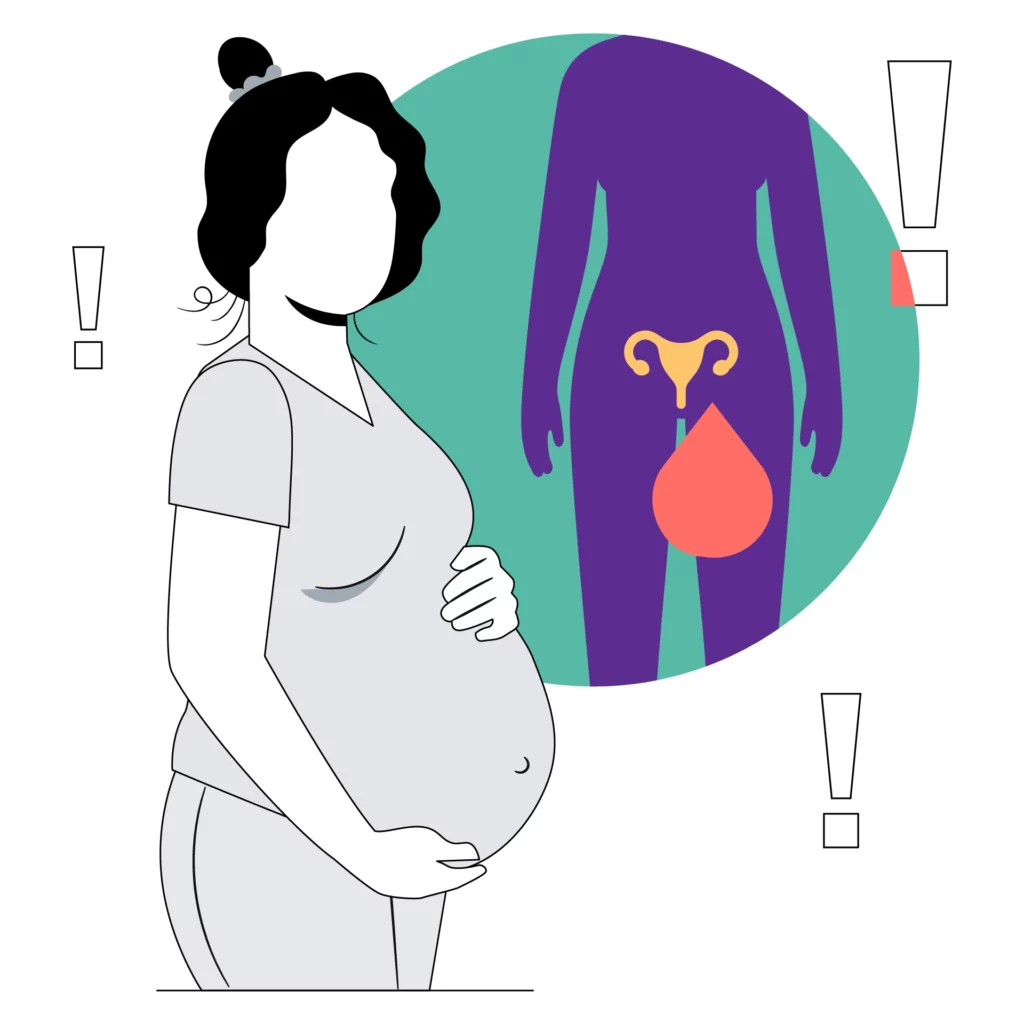
Second and Third Trimesters
Lack of fetal movement, vaginal bleeding or pregnancy spotting, back or abdominal cramps, and unexplained fluid or tissue passing from the vagina are all signs of a late pregnancy miscarriage (after 13 weeks).
Tell your doctor if you notice any of these symptoms.
If the fetus is no longer viable, your doctor might surgically remove the fetus using a medical procedure called dilation and evacuation, also known as D and E, or might give you medication to help you deliver the fetus and placenta vaginally.
Physical and emotional care is critical following a miscarriage in the second or third trimester. Ask your doctor when you can start going to your office again or work site if you work outside your home.
Inform your doctor if you believe that you need additional time for emotional recovery. They might be able to give your employer the necessary paperwork so you can take more time off.
Ask your doctor how long they advise you to wait before trying to conceive if you intend to become pregnant again.
FAQ
What do Doctors Mean by Spotting During Pregnancy?
Any bleeding from the vagina that occurs outside periods is known as spotting. You can test for pregnancy while bleeding or seemingly on your period.
Does Spotting Mean Miscarriage
Pregnancy spotting in the first trimester often raises miscarriage fears, but this isn't always the case. About half of the pregnant women who experience spotting in the first trimester miscarry. However, it indicates that only 50 per cent of them miscarry. Pregnancy spotting later in pregnancy is frequently less risky, but it can occasionally be very threatening.
What is Implantation Bleeding?
Implant bleeding during early pregnancy can happen at a time you would typically expect your period, but there is very little blood involved, and the bleeding is short-lived.
Implantation bleeding occurs around two weeks after ovulation when the fertilized egg implants in the uterus. Most of the time, women only notice a slight hint of red on their underwear or toilet paper, though sometimes it may be more pronounced.
Not all spotting during pregnancy is alarming. During the 1st trimester of pregnancy, implantation bleeding is common. For instance, it's common to experience some spotting after sex. If the spotting during earlier pregnancy, or otherwise, persists or becomes heavier, call your doctor. You can book an online doctor consultation at Bajaj Finserv Health for a detailed description of your health condition.
References
- https://www.msdmanuals.com/en-in/home/women-s-health-issues/symptoms-during-pregnancy/vaginal-bleeding-during-early-pregnancy
- https://americanpregnancy.org/healthy-pregnancy/pregnancy-complications/d-and-c-procedure-after-miscarriage/
Disclaimer
Please note that this article is solely meant for informational purposes and Bajaj Finserv Health Limited (“BFHL”) does not shoulder any responsibility of the views/advice/information expressed/given by the writer/reviewer/originator. This article should not be considered as a substitute for any medical advice, diagnosis or treatment. Always consult with your trusted physician/qualified healthcare professional to evaluate your medical condition. The above article has been reviewed by a qualified doctor and BFHL is not responsible for any damages for any information or services provided by any third party.
